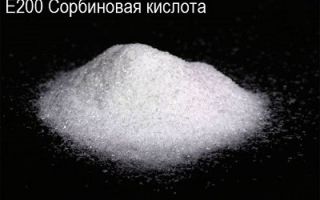Content
The desire of food manufacturers to increase the shelf life of goods puts buyers at risk. Food additives, preservatives contribute to the safety of food, improve taste. Most of them, when consumed in permitted amounts, have a neutral effect on the body. Some additives can have a negative effect. The benefits and harms of sorbic acid have been studied by specialists for a long time, leading to the prohibition of the preservative in some countries. How exactly does it affect the human body?
What is sorbic acid and what is it for
Sorbic acid is a natural preservative (also called E-200). Used in production to increase shelf life, protect against microorganisms and harmful fungi. Thanks to its antimicrobial properties, E-200 prevents products from becoming moldy. Colorless, poorly soluble crystals have the formula C6H8O2. Due to a number of useful properties, the preservative is still allowed in Ukraine, Russia, and in some European countries. Australian experts consider the additive to be harmful and banned it from production. It is generally accepted that sorbic acid in foods is useful in reasonable quantities.
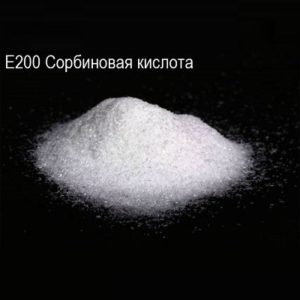
The history of the discovery of sorbic acid
The history of the discovery began in the middle of the nineteenth century. German chemist August Hoffmann was distilling rowan juice when he discovered a natural acid with antimicrobial properties. The suppression of the growth of fungi and other bacteria was beneficial, allowing the later use of the component of Sorbus rowan juice in industry.
The story developed rapidly. In the mid-1950s, large-scale production of sorbic acid began for its use in the food industry.

The benefits and properties of sorbic acid
A natural preservative can bring both benefits and harm to the body, but in an acceptable dosage, sorbic acid has a beneficial effect on humans:
- Possesses antimicrobial properties.
- It is used to enhance the activity of the immune system.
- It is useful for enhancing the detoxification capacity of the body.
In the minimum dosage, which is contained in food, E-200 is not toxic or carcinogenic.

Scope of sorbic acid
Each manufacturer is trying to improve the quality of their products, to increase the shelf life, for which they use sorbic acid. The scope is extensive:
- Making sausages is not complete without adding a component. Only 100 g of substance per 100 kg of product is added to the minced meat.
- Red caviar also requires the addition of preservatives. Thanks to the sorbin addition, salmon caviar is stored longer and does not contain dangerous bacteria. For greater benefit, supplement with urotropin.
- Soft drinks keep well when a natural preservative is added. Due to its antibacterial property, the warranty period is increased up to 30 days.
- Apple ciders do not spoil longer when added. It is necessary to carefully add the preservative so as not to disrupt the fermentation process.
- Potatoes are susceptible to fungus and other diseases on the tubers.Farmers process potatoes with mixtures of E-200 before planting.
- Cheese is processed to avoid the appearance of pathogenic microorganisms.
- The antibacterial property of E-200 is useful in fish production. Fresh fish is important to cleanse of bacteria that harm the product.
- Prunes are prone to mold, which prevents preservatives.
- The production of bread, confectionery products is accompanied by the addition of a substance. It is in confectionery that sorbic acid can be dangerous to children.
- In production, harmful bacteria are not allowed to enter the wine, which also helps sorbic acid.
- Sorbic acid is used in cosmetics for its moisturizing properties.
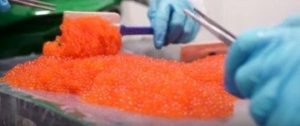
Permissible dosage of sorbic acid
It is important not to exceed the permissible dosage, since violation of this rule can harm the body. The consumption rate is 25 mg per 1 kg of body weight.
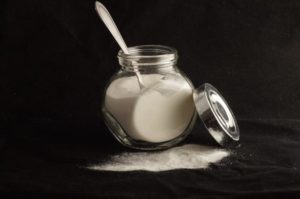
Sorbic acid for children
In small doses, E-200 does not harm the child's body. However, in its pure form, it can interfere with the absorption of vitamin B12, cause edema, and allergic reactions. Foods normally contain very little preservative to cause these side effects, but it is best to protect children from over-eating them.

The harm of sorbic acid to humans
The harm of a sorbin supplement to humans is manifested when the substance is consumed in pure form or in large quantities:
- allergic reactions;
- swelling;
- irritation of the mucous membranes;
- destruction of vitamin B12.
Conclusion
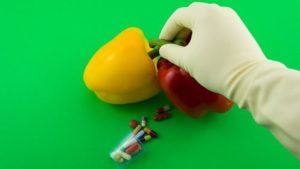
The benefits and harms of sorbic acid are of concern to many parents. Food additives can harm consumers. Although in small quantities E-200 is practically harmless, in high dosages and in its pure form it promotes the development of allergic reactions, irritation of mucous membranes, and the destruction of vitamin B12.

